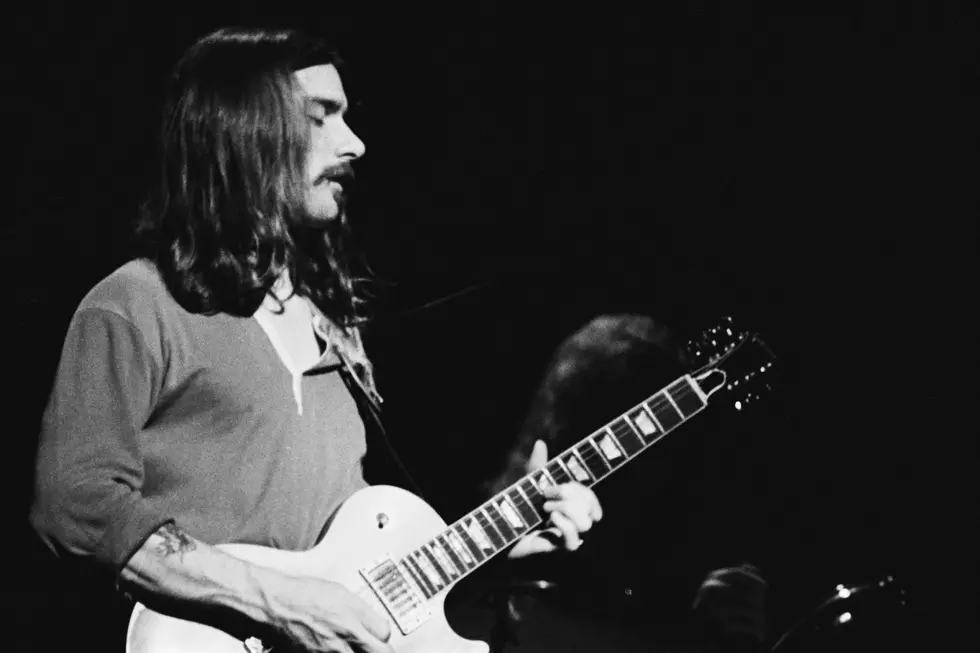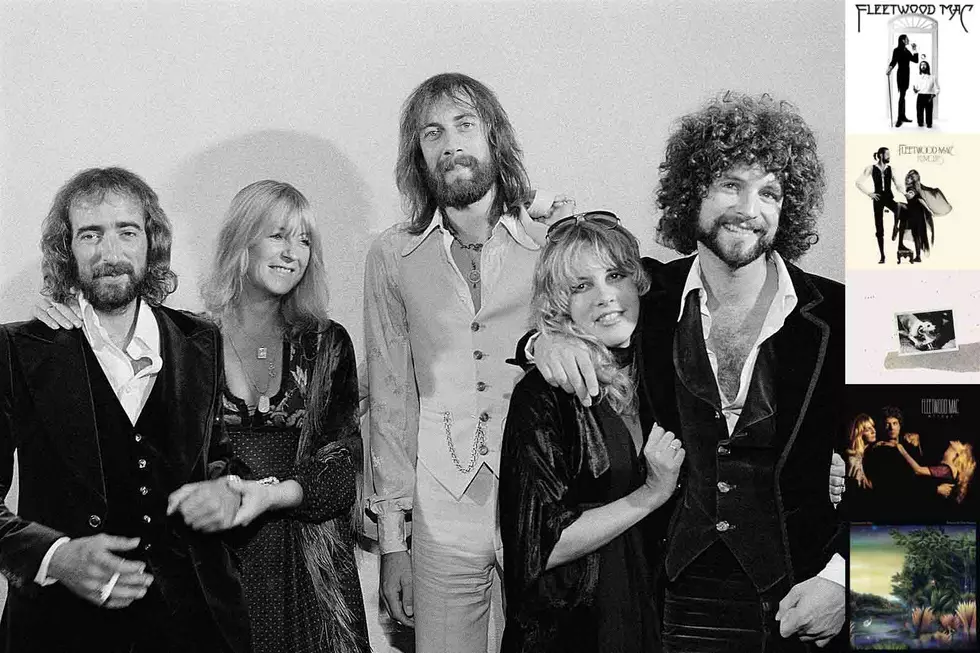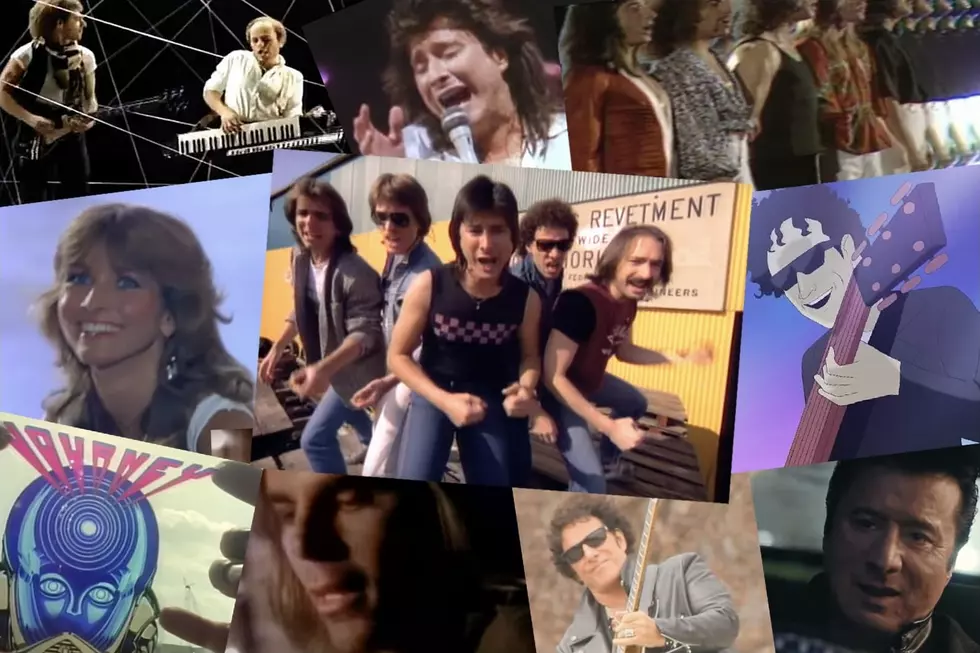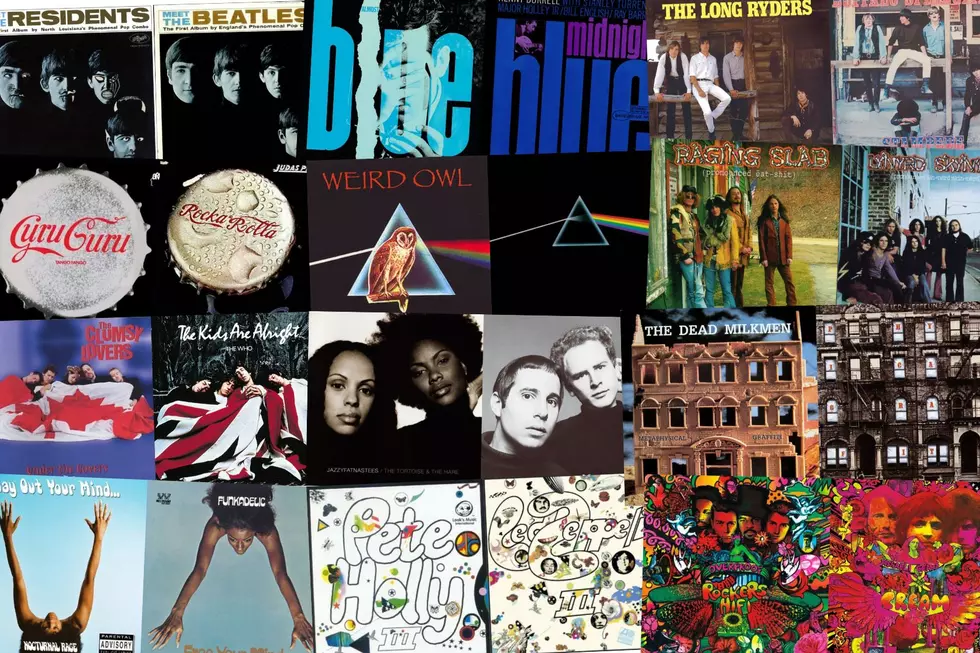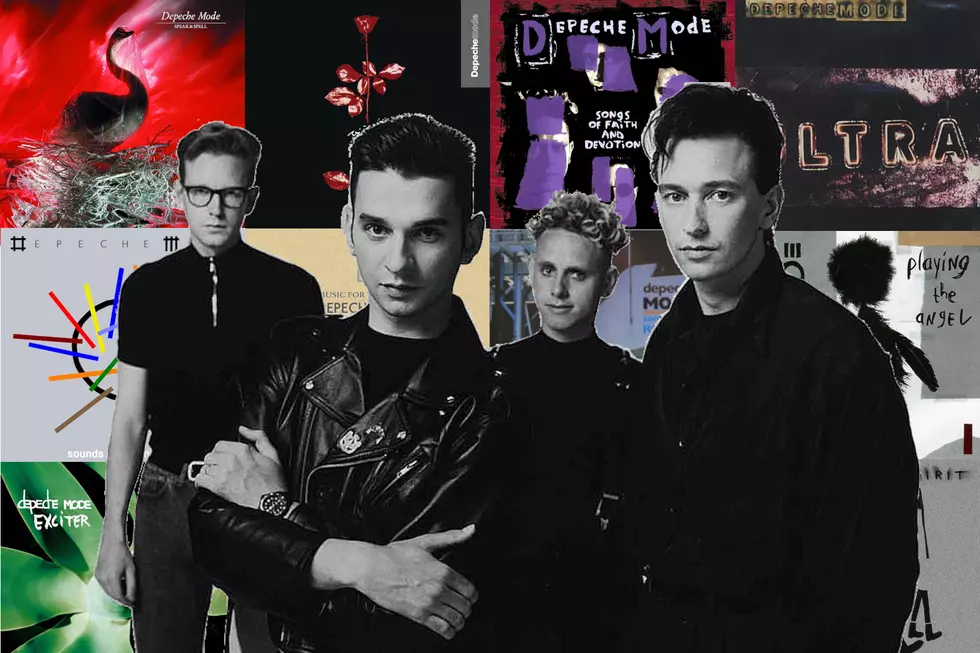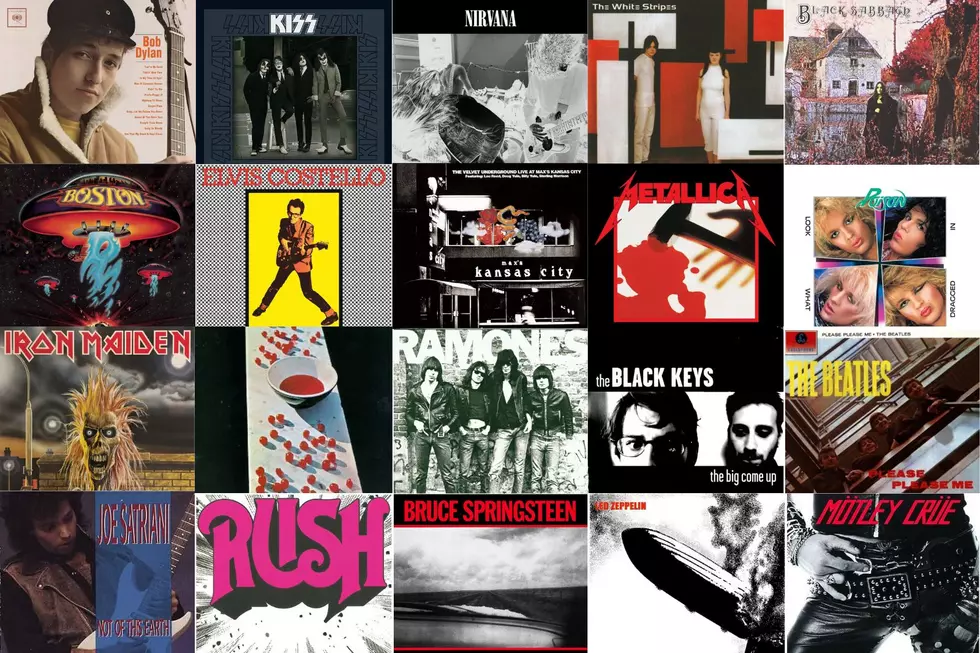
The History of Country-Rock: The ’90s, ’00s and Now
Country and rock proved a potent blend throughout the '70s, fueling a slew of albums by artists who ran the gamut from arena-filling stars like the Eagles to critical darlings like Gram Parsons. That sound had grown passé by the end of the '80s, driven underground by a combination of factors that included band breakups, shifting demographics and changing trends — but just when it seemed like they were forever torn asunder, the genres would be lured back together through a series of events over the following decade.
While mainstream audiences largely drifted away from country rock during the '80s, it never truly went away. Acts like Foster & Lloyd and the Kentucky Headhunters tinkered with the sound at various points on the spectrum, while the Georgia Satellites briefly made radio safe for twang in the mid-to-late '80s — and founding genre fathers Poco reunited their original lineup for a new album in the decade's waning days. For the most part, however, these releases were met with a certain degree of indifference, and even when they managed to score hits, they were fluke successes from artists seen as too country for rock and too rock for country.
The separation between the genres was compounded in the latter half of the decade by prevailing trends at either end of the divide. On the rock side, production ballooned under the weight of synthesizers and drum machines as the best-known bands absorbed or capitulated to Top 40 demands, often achieving power ballad glory along the way.
Country, meanwhile, still suffered something of a hangover from the rhinestone cowboy years of the early '80s; although the format had room for a handful of neo-trad or outright oddball artists like Dwight Yoakam and Lyle Lovett, the sound of mainstream country could be perceived as fairly monolithic and largely populated by slicker acts with a soft-rock countrypolitan tinge, such as Restless Heart and Highway 101.
Listen to Dwight Yoakam's 'Guitars, Cadillacs'
Rock and country's biggest acts were making more money than ever, but both genres were due for a shakeup — something to restore a little of the truth, raw honesty, and sense of danger that fueled each genre's most powerful moments — and the first few rumbles started rolling in during the spring of 1991.
By the '90s, Billboard's charts had been the arbiter of sales success in the music business for decades — and for decades, the industry had been aware (and consistently taken advantage of) the frequently sizable disconnect between actual sales and the numbers that vendors actually reported to the trades. In order to try and bridge the gap, Billboard implemented a new system called SoundScan, which took the human factor out of the equation by using a computer system to store purchase data at the point of sale.
It still wasn't perfect, and plenty of label executives complained about it, but SoundScan went into effect in March 1991, and in May, Billboard published the first Top 200 Albums Chart using the new system's data. By the end of the year, SoundScan's numbers fed into the Hot 100 Singles chart too.
The dawn of the SoundScan era had an immediate impact on country. The first week the system went into effect, a number of current releases by country artists leapfrogged up the charts — and none more so than Garth Brooks, who went from a quietly multi-platinum young artist to a Top 5 phenomenon in the space of seven days. It had already piled up three million in sales by the time SoundScan arrived, but after Brooks' No Fences LP jumped from No. 26 to No. 4 on the chart, he was suddenly on his way to becoming a household name.
Some label execs attributed the country surge to a "Midwestern bias" inherent in the new system, but it didn't matter. Brooks' ascension signaled country's return to the mainstream after years of being seen as regional music — and as his profile expanded, so did his stage show, which proved that country performers could be every bit as flashy or dynamic as Kiss or Billy Joel (both of whom he'd later cover).
Listen to Garth Brooks' 'Friends in Low Places'
"I think he brought the element of the 'big show' into country music. I don't think anyone had done that before him. More of a spectacle than just a bunch of guys on the stage playing, which country always kind of was," veteran Nashville guitarist Tom Bukovac tells Ultimate Classic Rock. "He's a talented guy. He really is. I think that started a lot for sure. Exciting shows and people going for more of that after him. He sure as hell was the most popular artist of his time, right?"
Initially — at least from a distance — it looked like SoundScan would have a positive impact on rock artists too. Metallica's Black Album debuted at No. 1 in August 1991, part of a summer that also saw chart-topping releases from Skid Row and Van Halen, and the fall brought huge records from Guns N' Roses and U2. At the same time, a rising tide of R&B artists continued to eat into rock's longstanding sales dominance — and in early 1992, the rules of the genre changed irrevocably.
A lot of things have been pinned on the explosive success of Nirvana's Nevermind album, and tracing the record's lasting impact would require thousands of words that don't have any place here. But with Nevermind's arrival, mainstream rock got the overdue shakeup it needed after the overproduced '80s — a corrosive (but still eminently radio-friendly) blast of noise that immediately drew a line in the generational sand and made just about everything that came before it sound quaint.
The rise of Nirvana, and the many like-minded acts that surfed in their wake throughout the early-to-mid-'90s, sucked the air out of a genre that had ruled the airwaves for years, upending entire careers in the process. Much has been made of the way grunge sent established bands like Warrant and Poison spinning off their axes, but it had an arguably even larger impact behind the scenes. Countless producers and session players who'd made their living creating polished rock records in the '80s found themselves scrambling for work.
Session vet and former Chicago member Bill Champlin looked back on the heyday of the '80s Los Angeles recording scene in an exclusive interview with Ultimate Classic Rock. "I had a Rolodex of people that called me regularly for work. If you're in town and you're there for the work, you get the call," he recalls. "When I first came to town, I was really working a lot. Then we jumped up to double scale, and I was working even more at that point in the game."
For some, Nashville looked like a natural fit, but making the transition from rock to country didn't go smoothly for every artist. Some acts, like Keel frontman Ron Keel — reinvented as Ronnie Lee Keel — were pegged as carpetbaggers. But for others, a grasp of old-fashioned songcraft and a way with radio polish proved handy tools, especially as a growing group of Nashville artists pivoted toward the nascent "young country" format that was already angling toward Top 40 airwaves. Still, breaking into the city's session ranks was often easier said than done.
"When I moved down to L.A., there were a lot of people trying to come in when the city was kicking like a mule — records were being made like crazy. A lot of people didn't get a groove going; they were here for a while and then they left. I saw the same thing happening in Nashville," says Champlin. "When I did move to Nashville, I think a lot of singers that had the work saw me coming and were like, 'No no no no, don't let this guy in, don't open the door a crack, he'll get all our work.' I was talking to my kid and I said, 'Nashville's kind of cliquey for me,' and he said, 'Dad, so is L.A. It just doesn't feel that way because you're in the clique.'
"I was in Chicago for most of the time that I was there, and they were on the road so much. The amount of road work they did then was even more than when we were all kids," laughs Champlin. "There was one year, I was in Nashville for four days. Why did I move there? For me, I just ended up with bad allergies. You know real 'twangy' vocals down there? A lot of times it has nothing to do with style, it has to do with pollen. I referred to myself as 'Snot Farm' when I was down there. I did one session where the engineer goes, 'Damn, Billy. You're sounding awful local.'"
Guitarist Dann Huff, who'd already piled up an incredible list of credits during the '80s as a session player for a wide variety of artists, was uniquely well positioned to take advantage of the paradigm shift. Although he was known to rock fans as the frontman for the short-lived band Giant (and he'd been a member of Christian rockers White Heart before that), he also popped up in countless liner notes throughout the decade — for rock artists as well as country and contemporary Christian acts. Although he retained a rock presence in the '90s, he doubled down on country credits while moving into production, quickly making a name for himself as a go-to guy for artists seeking a polished, Top 40-ready country sound.
Watch Giant's Video for 'See You in My Dreams'
The Nashville-born Huff had an easier time staking his country claim — and it also didn't hurt that he was a hell of a guitarist who'd been more or less living in recording studios for years — but the influx of pop and rock talent couldn't help but provoke a little tension between traditionalists and the new guard. The genre's evolution was personified in the mid-'90s by Shania Twain, who racked up tens of millions in sales by blurring the line between country, pop and rock — all with the assistance of her husband and producer, rock legend Robert John "Mutt" Lange, who took pages from the playbook he'd used on artists like Def Leppard and used them to turn country music into an even bigger business.
At the same time, Nashville continued to attract young players who added an influx of new talent to the city's ranks of session players — including Bukovac, who migrated there in the early '90s and went on to become a first-call guitarist for a long list of artists and producers that often included Huff. For Bukovac, Nashville was less of a business decision than a lifestyle choice — and one that allowed for an honest expression of the love of music that had gotten ground up in the increasingly corporate world of rock.
"I just thought this was a real vibrant music city," Bukovac tells Ultimate Classic Rock. "My favorite thing about Nashville is that it has always been and it will always be like a national preserve for music. People here give a s—- about ancient forms of music that are completely forgotten everywhere else. Nashville is like a museum of all these weird old music things. No matter how oddball it is, there's someone here that can do it. It's really great. I love that part. The rest of the world has just forgotten about most of this archaic s—-, you know what I'm saying? People have a reverence for music here. In other cities, musicians are kind of like black sheep, but they respect musicians here."
As sales for Top 40-catering country artists exploded, they continued to crater for many of the rock veterans who'd enjoyed success in the '70s and '80s, and Nashville's expanded musical boundaries beckoned for a widening circle of artists who'd never been considered country — particularly those who could comfortably fit in the impeccably produced soft-rock parameters that contained early '90s hit records for groups like the aforementioned Restless Heart. Former Chicago singer and bassist Peter Cetera, for example, signed with River North Records in the mid-'90s, and cut a pair of duets with River North Nashville artists Ronna Reeves and Crystal Bernard.
Listen to Peter Cetera and Ronna Reeves' 'S.O.S.'
River North was also responsible for Stars and Stripes Vol. 1, a 1996 release that found the Beach Boys performing songs from their catalog alongside a handful of country artists. It's a formula that's been repeated by other labels for assorted veteran rock acts over the years, including Mötley Crüe and the Doobie Brothers, and although none of the releases in question have generated much in the way of sales success, they reflect the more commercially-minded, calculatedly mainstream cross-pollination that's developed between rock and country since the mid-to-late '90s.
On the rock side, a growing number of older artists have gambled on country airplay with records that were either recorded in or allegedly inspired by Nashville. In 2002, Kid Rock scored an unexpected country hit with "Picture," a ballad duet with Sheryl Crow (re-cut with Alison Moorer for the single version), proving there was an appetite for a hybrid sound — provided it kept fairly close to the middle of the road. "Picture" presaged a handful of like-minded efforts, not all of which were able to duplicate Rock's success; Poison singer Bret Michaels saw minimal sales with his 2005 country-rock effort Freedom of Sound, but Bon Jovi scored a No. 1 country hit with a re-recorded version of its 2006 single "Who Says You Can't Go Home," retrofitted to serve as a duet between Jon Bon Jovi and Sugarland singer Jennifer Nettles.
Watch Bon Jovi With Jennifer Nettles in the 'Who Says You Can't Go Home' Video
On the country side, meanwhile, a widening circle of younger artists adopted a sound that, while still identifiably "country" in a few respects, incorporated enough rock and pop overtones to easily make inroads at adult contemporary and Top 40 stations. Rascal Flatts, Lady Antebellum and Sugarland are but a few of the acts to find multi-platinum success with this formula — and Taylor Swift, arguably the biggest pop star of the past decade, arrived at her current glossy sound through a series of increments, starting with the country strains of her 2006 debut.
The slick, smooth middle ground this sound has paved is, to quote the old lyric, a little bit country and a little bit rock 'n' roll — but like the song that line's taken from, it's really mostly pop. As evidenced by Steven Tyler, who hooked up with Swift's label Big Machine for a solo record that was billed as a country album but whose singles hew close to the Top 40 template established by the aforementioned artists, it's an approach that continues to yield commercial dividends. Observing the trend in his UCR interview, Champlin pointed out the obvious.
"You know, pop is where you're going to sell more records. Country has always been a niche market," Champlin notes. "Country fans are nothing if they're not loyal, and there's something really cool about it, so there always seems to be a country market. Now, the pop market went kind of nutty there for a while. The pop market did what movies did — if you're not young, you're out of here. I think ageism took a big chunk out of the pop market."
Safe as these records might sound, putting them out carries a certain risk — one familiar to the same rock artists who once courted pop airplay with power ballads in the '80s. If they get you on the radio and sell records, they can also damage your long-term credibility to an extent. Hardcore fans on either side of the genre divide can feel betrayed or abandoned when an artist forsakes his supposed roots, just as they can feel patronized when an artist moves into a new genre too abruptly or obviously. This credibility gap can be most painfully felt for country acts and listeners, some of whom remember when their music was still widely seen as provincial stuff that had no room outside the South or Midwest.
"It just seems to me that people are always trying to push the envelope inside the country music idiom to be as rock as they can possibly make it and they consider it getting away with it," Bukovac tells Ultimate Classic Rock. "You don't see rock guys try to get away with making things more country. That's weird to me. If you really want to play rock that bad, why don't you just play in a rock band? I never understood these guys that want to be really bad-ass rock 'n' roll guys inside the country music element. It always struck me as weird. When you see these cats live, they just want to play rock and roll, so be a rock 'n' roll band. You know what I mean? Let's take the pads off and really do it. I just think country is its own idiom. It always has been."
Yet even if pop-friendly records have largely defined the last 25 years of country-rock crossover in terms of sales, they don't tell the whole story. The same time period has also seen the rise of the Americana format — initially used as a catchall for rootsy veteran acts like John Hiatt and late-period Steve Earle, but now a sound that serves a sort of godfather for a growing line of artists whose songs comfortably draw from a broad palette that stretches from classic country to hard rock and a messy constellation of points in between. Eric Church, Brantley Gilbert, Chris Stapleton, Hayes Carll, Anderson East and Sturgill Simpson are just a few of the better-known examples from this group — acts routinely held up as standard-bearers for "real country" or saviors of the genre's future, even as they stubbornly insist they're simply making the music they want to hear. For them, the question of what's "rock" or "country" matters less than what's honest.
Watch Sturgill Simpson's Video for 'Turtles All the Way Down'
"When I was a kid and I heard the first Aerosmith record, with 'Dream On,' that's one of the highlights of music ever," muses producer Dave Cobb in conversation with UCR. "They had so much heart and soul on that stuff. That's what I'm attracted to in country, you know? I'm attracted to that when I hear Blind Faith do 'Can't Find My Way Home,' or when I hear 'Presence of the Lord,' or when I hear the Stones do 'Wild Horses.' That's not too different from what we're doing now. I mean, obviously they're the Rolling Stones, but as far as feeling, we're just picking up from our favorite records, whether they be country or rock or whatever it was."
Cobb, a two-time Grammy winner whose list of recent credits includes efforts from Stapleton, East and Simpson as well as the various-artists concept record Southern Family, shrugs off the notion that his sound has any more intrinsic rock or country credibility than anyone else's. As he sees it, there's enough room for everyone on store shelves and the radio dial; rather than mounting an insurgency, the albums he's produced occupy what he describes as another "lane."
"We're just worried about making it feel right. That might require a slide guitar or an oboe, I don't know," Cobb tells UCR. "I do think Southern music has a swagger, and British bands obviously managed to pull it off, as well as American bands from the West Coast, but I think it comes from here. Rock 'n' roll, soul, bluegrass, blues — it all comes from the South. That's part of the equation. Secondly, I think it's the voice, the way somebody sings. I think that probably defines the 'country' aspect more than anything else. There are probably some classic rock hits that are really country songs, you know? I don't worry about classifications. If I did, we could spend all day with the genre police."
"All I'm concerned about is what's going on with the particular situation. I'm praying that it's going to be an awesome song and I can really bring it. I don't care what the f--- kind of music it is," says Bukovac. "Great singer with a cool idea — that's the only thing that gets us going. I feel like all these session players are just vehicles waiting to be driven by an unbelievable song, and when it comes around, everybody knows it. Everybody just lights up. Something with a little extra to it. Everybody is so happy to be there at that moment."
Cobb echoes Bukovac's description of the Nashville session scene. "Without question, the players in Nashville are the best musicians in the world," he asserts. "Period. Period. There are incredible players everywhere and people who'd defy what I just said, but there's no one who can play like these guys down here."
It was partly in tribute to that ethic and that aesthetic — and the generations of stories that inform them — that Cobb was inspired to curate Southern Family. And for those who lament that the mainstream has once again gone overboard in filtering out that truth and raw honesty that rock and country found itself missing 25 years ago, Cobb offers a glimmer of hope when describing the comically quick label meeting where the project was greenlit.
"I was kinda joking about doing a concept album. I told them the whole meaning behind it and they said, 'Yeah, do it,'" laughs Cobb. "I said, 'Well, let me sell you on it. It's about people writing personal songs about their families —' 'Yeah, yeah, do it.' 'No, guys, I don't think you heard me…' I don't think I heard them say yes, you know? I was still trying to explain it. There's no way, if I hadn't had their backing on this, that it would ever have gotten done. The intent of the album was really to take a snapshot of Nashville right now. What's exciting about it — this other lane."
Wherever country and rock go from here — however the mainstream adapts to absorb the various strains of their intersection, and vice versa — it's clear there will always be artists who play at the boundaries, regardless of the reasons. Which is as it should be, really; as Champlin points out to UCR, no matter how you dress them up, everyone in the Western world is really making music with the same basic ingredients.
"You've got 12 notes and we all use them all the time, whether it's country or anything," shrugs Champlin. "It's just 12 notes."
35 Important Moments in Country-Rock History
More From Ultimate Classic Rock
